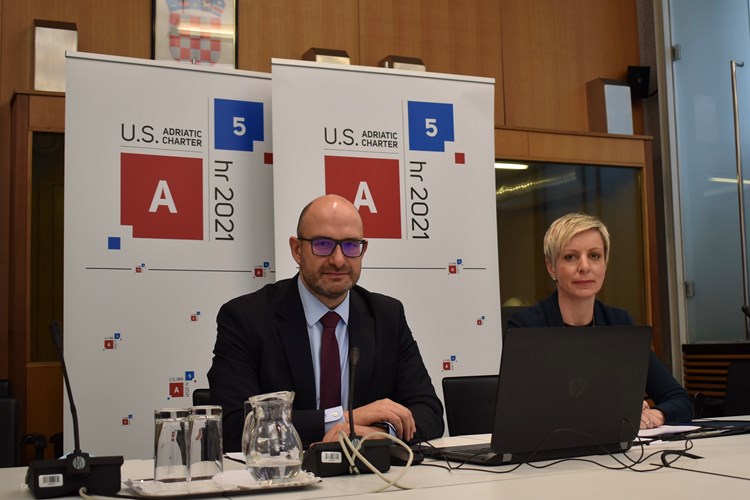- Published: 11.03.2021.
Meeting of A5 defence, political directors
Director-General for Multilateral and Global Affairs at the Ministry of Foreign and European Affairs Mato Škrabalo and Dunja Bujan from the Defence Policy Directorate-General of the Defence Ministry chaired a videoconference of the US-Adriatic Charter (A5) defence policy directors and political directors
Director-General for Multilateral and Global Affairs at the Ministry of Foreign and European Affairs Mato Škrabalo and Dunja Bujan from the Defence Policy Directorate-General of the Defence Ministry chaired a videoconference of the US-Adriatic Charter (A5) defence policy directors and political directors.
Croatia took over the A5 presidency in 2021 from Bosnia and Herzegovina.
Also participating in the meeting were defence and foreign affairs representatives from other A5 member states (Albania, Bosnia and Herzegovina, Montenegro, Macedonia and the Unites States), as well as representatives from the observer countries (Kosovo, Slovenia and Serbia).
This year’s first high-level meeting was opened by the Croatian representatives, who outlined the programme and priorities as well as the activity calendar of the Croatian presidency.
“Through joint efforts we established the Charter, which has grown into not only a successful model of regional security and defence cooperation, but also a driving force for the integration of all of its member states into NATO. Even though the pandemic has hampered our practical cooperation, these challenges give us additional reason to advance the cooperation so that our region could become more resilient to the security challenges we all are facing,” said Bujan.
The participants then exchanged views and proposals for enhancing the A5 armed forces’ interoperability, advancing cooperation in the fight against cyber threats and the importance of Euro-Atlantic processes in Southeast Europe.
In addition, the participants underscored the importance of NATO’s Open Door policy as a catalyst for reform as well as cooperation with the US and transatlantic ties in forming responses to the complex security threats of today, notably hybrid and cyber threats as well as disinformation campaigns, which are increasingly targeting the countries of Southeast Europe.
Škrabalo stressed that the continuation of the Open Door policy was crucial for the Western Balkans as well as for the security and stability of the Euro-Atlantic area. “It is a process that should complement the EU enlargement. The European unification process will truly be completed only when the Western Balkans is included too,” Škrabalo underlined.
The US-Adriatic Charter was founded in 2003 as a partnership regional security and defence initiative whose fundamental goal is to strengthen multilateral relations between countries of Southeast Europe, with the aim of a full NATO and EU integration.



